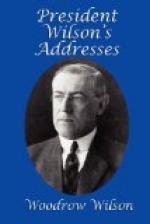I have had some experiences in the last fourteen months which have not been entirely reassuring. It was universally admitted, for example, my fellow-citizens, that the banking system of this country needed reorganization. We set the best minds that we could find to the task of discovering the best method of reorganization. But we met with hardly anything but criticism from the bankers of the country; we met with hardly anything but resistance from the majority of those at least who spoke at all concerning the matter. And yet so soon as that act was passed there was a universal chorus of applause, and the very men who had opposed the measure joined in that applause. If it was wrong the day before it was passed, why was it right the day after it was passed? Where had been the candor of criticism not only, but the concert of counsel which makes legislative action vigorous and safe and successful?
It is not patriotic to concert measures against one another; it is patriotic to concert measures for one another.
In one sense the Declaration of Independence has lost its significance. It has lost its significance as a declaration of national independence. Nobody outside of America believed when it was uttered that we could make good our independence; now nobody anywhere would dare to doubt that we are independent and can maintain our independence. As a declaration of independence, therefore, it is a mere historic document. Our independence is a fact so stupendous that it can be measured only by the size and energy and variety and wealth and power of one of the greatest nations in the world. But it is one thing to be independent and it is another thing to know what to do with your independence. It is one thing to come to your majority and another thing to know what you are going to do with your life and your energies; and one of the most serious questions for sober-minded men to address themselves to in the United States is this: What are we going to do with the influence and power of this great Nation? Are we going to play the old role of using that power for our aggrandizement and material benefit only? You know what that may mean. It may upon occasion mean that we shall use it to make the peoples of other nations suffer in the way in which we said it was intolerable to suffer when we uttered our Declaration of Independence.
The Department of State at Washington is constantly called upon to back up the commercial enterprises and the industrial enterprises of the United States in foreign countries, and it at one time went so far in that direction that all its diplomacy came to be designated as “dollar diplomacy.” It was called upon to support every man who wanted to earn anything anywhere if he was an American. But there ought to be a limit to that. There is no man who is more interested than I am in carrying the enterprise of American business men to every quarter of the globe. I was interested in it long before




